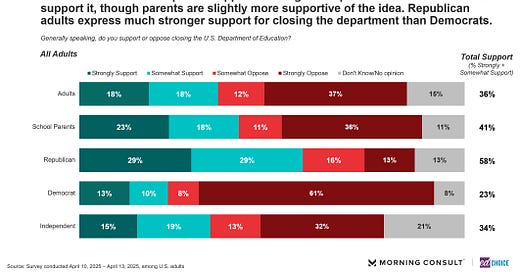So you want to close the Department of Education...
New polling data suggest Americans aren’t on board
“I want to start with the role of the Department of Education.”
These words, said verbatim by Representative Madeleine Dean and in other words by many of her colleagues, sum up the U.S. Department of Education’s budget hearing on Wednesday morning. It was a striking scene of juxtaposition—Education Secretary Linda McMahon walking a fine line to testify that she would both carry out the education laws created by Congress and pursue the ultimate goal of dismantling the department (rendering her own position obsolete).
But shutting down the U.S. Department of Education is a hard sell. Don’t take my word for it. In April, we surveyed over two thousand Americans to ask that very question: Generally speaking, do you support or oppose closing the Department of Education?
Only 36% of American adults support closing the U.S. Department of Education. Nearly half of Americans (49%) oppose closing the Department of Education. That leaves 15% who say that they don’t know.
We can examine those groups in finer detail. How many people strongly support or oppose the idea? About half of people who support closing the department say they feel strongly about it, which boils down to 18% of Americans. On the other hand, those who oppose the idea tend to feel more strongly. Thirty-seven percent of Americans strongly oppose closing the Department of Education—a plurality of Americans. The largest camp of Americans are strongly against shutting down the department.
This plurality of strong opposition is consistent across many demographics, including age, race, income level, and so on. The only exception shows up along political lines. A majority of Republicans (58%) support closing the Department of Education. In contrast, 69% of Democrats oppose closing the department.
The partisan divide seems open-and-shut at first glance, and not particularly surprising. But that picture of polarization becomes muddied when we take a closer look at how Americans feel about the day-to-day work that the Department of Education does.
So let’s skip ahead—public opinion on the fate of the department notwithstanding. We can move on to the nuts and bolts of it all. Let’s take the political controversy out of the equation and consider what functions the Department of Education actually carries out.
According to this very helpful breakdown from Pew, the DOE’s largest task is distributing grants and loans. This provides funding to public K-12 schools that serve low-income students and students with special needs, as well as assisting with student loans for college. The department also enforces students’ civil rights and works to uphold education equal access laws.
To separate these individual tasks from the polarizing larger question of dismantling the department, we asked respondents their opinion on each one: To what extent, if any, should the federal government have a role in the following areas in K-12 education?
Providing funding for schools in need is broadly supported. The majority of Americans agree that the federal government should play a major role in providing funding for schools serving students with disabilities (58%) and low-income students (56%). If we include Americans who think the federal government should play a minor role, those figures rise to 78% and 77% respectively. Among school parents, support for federal funding to schools in need rises to a staggering 85%.
Notably, support for these functions holds among Republicans as well. Half of Republicans think the federal government should have a major role in providing funding for low-income schools (49%) and schools with students who have special needs (51%). That rises to three-fourths of Republicans if we include the federal government playing a minor role.
But what about the enforcement of civil rights? A majority of Americans think the federal government should play a major role in ensuring equal opportunities in K-12 education (53%) and protecting students’ civil rights at school (50%). (Once again, these figures rise to 70+% if we include a minor role.) Among Republicans, a plurality thinks the federal government should play a major role (42-43%), and a firm majority (66-69%) believes the federal government has some kind of role to play in student civil rights.
Long story short, the political controversy surrounding the U.S. Department of Education does not seem to fully translate to its key functions. The numbers say that both Republicans and Democrats want the core duties of the department to continue. They differ on the existence of the department itself.
We could speculate on the reasons behind the partisan difference. But the larger story here is one of commonality, not difference. Americans support the core functions of the Department of Education—funding schools in need, protecting civil rights, upholding equal opportunity. These are not partisan ideas, they are widely shared priorities even across party lines. Maybe that’s why Americans generally oppose closing the Department of Education—not out of political loyalty or attachment to a federal agency, but because they value the work that it does.
In any case, this raises an important question: if the U.S. Department of Education is shuttered, will the federal government continue to fulfill these functions? And if so, how do they plan to do it?
It’s one matter to close a federal department, and it’s another matter altogether to pull it off successfully.






How many Americans recognize that we cannot afford the federal government we have; that the Federal government must shed some valued functions?